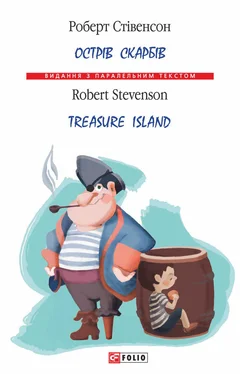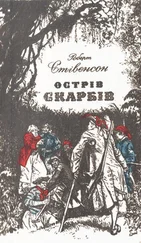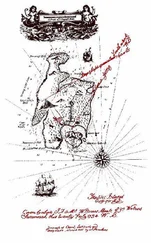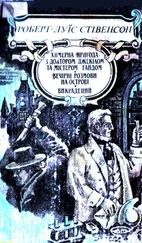All the time he lived with us the captain made no change whatever in his dress, but to buy some stockings from a hawker. One of the cocks of his hat having fallen down, he let it hang from that day forth, though it was a great annoyance when it blew. I remember the appearance of his coat, which he patched himself upstairs in his room, and which, before the end, was nothing but patches. He never wrote or received a letter, and he never spoke with any but the neighbours, and with these, for the most part, only when drunk on rum. The great sea-chest none of us had ever seen open.
He was only once crossed, and that was towards the end, when my poor father was far gone in a decline that took him off.
Dr. Livesey came late one afternoon to see the patient, took a bit of dinner from my mother, and went into the parlour to smoke a pipe until his horse should come down from the hamlet, for we had no stabling at the old «Benbow». I followed him in, and I remember observing the contrast the neat, bright doctor, with his powder as white as snow and his bright, black eyes and pleasant manners, made with the coltish country folk. Аnd above all, with that filthy, heavy, bleared scarecrow of a pirate of ours, sitting, far gone in rum, with his arms on the table. Suddenly he – the captain, that is – began to pipe up his eternal song:
«Fifteen men on the dead man’s chest —
Yo-ho-ho, and a bottle of rum!
Drink and the devil had done for the rest —
Yo-ho-ho, and a bottle of rum!»
At first I had supposed «the dead man’s chest» to be that identical big box of his upstairs in the front room, and the thought had been mingled in my nighmares with that of the one-legged seafaring man. But by this time we had all long ceased to pay any particular notice to the song; it was new, that night, to nobody, but Dr. Livesey. Аnd on him I observed it did not produce an agreeable effect, for he looked up for a moment quite angrily before he went on with his talk to old Taylor, the gardener, on a new cure for the rheumatics. In the meantime, the captain gradually brightened up at his own music, and at last flapped his hand upon the table before him in a way we all knew to mean silence. The voices stopped at once, all but Dr. Livesey’s; he went on as before speaking clear and kind and drawing briskly at his pipe between every word or two. The captain glared at him for a while, flapped his hand again, glared still harder, and at last broke out with a villainous, low oath, «Silence, there, between decks!»
«Were you addressing me, sir?» says the doctor; and when the ruffian had told him, with another oath, that this was so, «I have only one thing to say to you, sir», replies the doctor, «that if you keep on drinking rum, the world will soon be quit of a very dirty scoundrel!»
The old fellow’s fury was awful. He sprang to his feet, drew and opened a sailor’s clasp-knife, and balancing it open on the palm of his hand, threatened to pin the doctor to the wall.
The doctor never so much as moved. He spoke to him as before, over his shoulder and in the same tone of voice, rather high, so that all the room might hear, but perfectly calm and steady: «If you do not put that knife this instant in your pocket, I promise, upon my honour, you shall hang at the next assizes».
Then followed a battle of looks between them, but the captain soon knuckled under, put up his weapon, and resumed his seat, grumbling like a beaten dog.
«And now, sir», continued the doctor, «since I now know there’s such a fellow in my district, you may count I’ll have an eye upon you day and night. I’m not a doctor only; I’m a magistrate. Аnd if I catch a breath of complaint against you, if it’s only for a piece of incivility like tonight’s, I’ll take effectual means to have you hunted down and routed out of this. Let that suffice».
Soon after, Dr. Livesey’s horse came to the door and he rode away. But the captain held his peace that evening, and for many evenings to come.
1
Старий морський вовк у корчмі «Адмірал Бенбоу»
Сквайр Трілоні, доктор Лівсі та інші джентльмени попросили мене написати все, що я знаю про Острів Скарбів. Вони хочуть, щоб я розповів усю історію від початку до кінця, не приховуючи нічого, крім розташування острова, та й то тільки тому, що й досі звідти не вивезли всі скарби. Отже, я беруся за перо цього року Божого 17… і повертаюся думками до тих часів, коли мій батько мав корчму «Адмірал Бенбоу» і коли засмаглий старий моряк зі рубцем від шаблі на щоці оселився під нашим дахом.
Я пам’ятаю, ніби все це було тільки вчора, як він підійшов, важко ступаючи, до дверей нашої корчми, а слідом за ним везли на тачці моряцьку скриню. Це був високий, міцний, огрядний чоловік з темним, засмаглим обличчям. Засмальцьована косичка стирчала над коміром його брудної синьої куртки. Руки в нього були зашкарублі, порізані, з чорними поламаними нігтями, а шабельний рубець на щоці – бруднувато-білявого кольору зі свинцевим відтінком. Пригадую, як він окинув поглядом бухту і тихенько свиснув, а потім раптом затяг давню морську пісню, яку так часто наспівував і потім:
П’ятнадцять хлопців на скрині мерця.
Йо-го-го, ще й пляшечка рому!
Голос у нього був старечий, хрипкий, верескливий, немов рипучі важелі кабестана.
Потім він постукав у двері кінцем палиці, що скидалася на гандшпуг, і, коли вийшов мій батько, грубо зажадав від нього склянку рому. Йому винесли ром, і він почав поволі його пити, як великий знавець, смакуючи кожен ковток і все ще поглядаючи на скелі й на нашу вивіску.
– Бухта нічогенька, – пробурмотів він нарешті. – Непогане місце для шинку. Багато народу, хазяїне?
Батько відповів, що, на жаль, народу тут буває дуже мало.
– То й добре! – сказав моряк. – Пристань саме для мене. Гей, ти, голубе! – гукнув він чоловікові, який віз тачку. – Під’їжджай сюди, допоможи мені втягти скриню. Я тут затримаюсь трохи, – вів він далі. – Чоловік я простий. Ром, шинка, яєчня – і більше мені нічого не треба. Хіба тільки ще ота скеля, з якої видно в морі кораблі… Як мене звати? Ну що ж, зовіть хоч би й капітаном. Еге, я бачу, що вас турбує… Маєте!
Читать дальше












